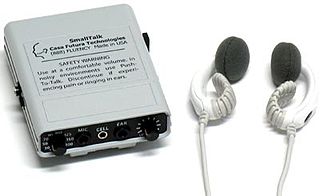Related Research Articles
Stuttering, also known as stammering and dysphemia, is a speech disorder in which the flow of speech is disrupted by involuntary repetitions and prolongations of sounds, syllables, words, or phrases as well as involuntary silent pauses or blocks in which the person who stutters is unable to produce sounds. The term stuttering is most commonly associated with involuntary sound repetition, but it also encompasses the abnormal hesitation or pausing before speech, referred to by people who stutter as blocks, and the prolongation of certain sounds, usually vowels or semivowels. According to Watkins et al., stuttering is a disorder of "selection, initiation, and execution of motor sequences necessary for fluent speech production". For many people who stutter, repetition is the main problem. The term "stuttering" covers a wide range of severity, from barely perceptible impediments that are largely cosmetic to severe symptoms that effectively prevent oral communication. Almost 70 million people worldwide stutter, about 1% of the world's population. Four-fifths of stutterers are male. It is common for individuals who suffer from a lifetime stuttering problem for their symptoms to worsen considerably as they reach their 70s and 80s.

Jean Berko Gleason is a psycholinguist and professor emerita in the Department of Psychological and Brain Sciences at Boston University who has made fundamental contributions to the understanding of language acquisition in children, aphasia, gender differences in language development, and parent–child interactions.

The American Speech–Language–Hearing Association (ASHA) is a professional association for speech–language pathologists, audiologists, and speech, language, and hearing scientists in the United States and internationally. It has more than 197,856 members and affiliates.
J. Scott Yaruss is a Professor of Communicative Sciences and Disorders at Michigan State University.
Brian James MacWhinney is a Professor of Psychology and Modern Languages at Carnegie Mellon University. He specializes in first and second language acquisition, psycholinguistics, and the neurological bases of language, and he has written and edited several books and over 100 peer-reviewed articles and book chapters on these subjects. MacWhinney is best known for his competition model of language acquisition and for creating the CHILDES and TalkBank corpora. He has also helped to develop a stream of pioneering software programs for creating and running psychological experiments, including PsyScope, an experimental control system for the Macintosh; E-Prime, an experimental control system for the Microsoft Windows platform; and System for Teaching Experimental Psychology (STEP), a database of scripts for facilitating and improving psychological and linguistic research.
Judith Maginnis Kuster, aka Judith A. Kuster, is a certified speech-language pathologist and Professor Emerita from Minnesota State University, Mankato where she taught in the Department of Speech, Hearing and Rehabilitation Services for 25 years. She holds an MS in speech-language pathology from the University of Wisconsin, Madison and an MS in counseling from Minnesota State University, Mankato. She is an ASHA FELLOW and a Board Recognized Specialist in Fluency BRSF-R.
David A. Daly is a fluency author, researcher, and center owner.
Speech production is the process by which thoughts are translated into speech. This includes the selection of words, the organization of relevant grammatical forms, and then the articulation of the resulting sounds by the motor system using the vocal apparatus. Speech production can be spontaneous such as when a person creates the words of a conversation, reactive such as when they name a picture or read aloud a written word, or imitative, such as in speech repetition. Speech production is not the same as language production since language can also be produced manually by signs.

Electronic fluency devices are electronic devices intended to improve the fluency of persons who stutter. Most electronic fluency devices change the sound of the user's voice in his or her ear.
Lise Menn is an American linguist who specializes in psycholinguistics, including the study of language acquisition and aphasia. She is currently Professor Emerita of linguistics and was a fellow of the Institute for Cognitive Science at the University of Colorado at Boulder in Boulder, Colorado until her retirement in 2007.
Stuttering therapy is any of the various treatment methods that attempt to reduce stuttering to some degree in an individual. Stuttering can be a challenge to treat because there is a lack of evidence-based consensus about therapy. Some believe that there is no cure for the condition.

Maryanne Wolf is the UCLA Distinguished Visiting Professor of Education and Director of the UCLA Center for Dyslexia, Diverse Learners, and Social Justice and the Chapman University Presidential Fellow. She is also the former John DiBiaggio Professor of Citizenship and Public Service, Director of the Center for Reading and Language Research, and Professor in the Eliot-Pearson Department of Child Study and Human Development at Tufts University.
The College of Arts and Sciences at Illinois State provides many majors and minors at the undergraduate level. Some of these programs are interdisciplinary. Many departments have teacher education programs where a student majors in a subject discipline while getting credentials towards a teaching certificate.
HASA is a social benefit 501(c)(3) organization located in Baltimore, Maryland that specializes in facilitating communication. Established in 1926, the organization provides special education services through Gateway School, audiology and speech-language services through its Clinical Services Department, and interpreting services for the deaf through its CIRS Interpreting Department.
The University of Alberta Faculty of Rehabilitation Medicine, located in Edmonton, Alberta, Canada, is home to North America's only free-standing faculty of rehabilitation medicine and is composed of three departments, 11 research groups, six student clinics and programs and five institutes and centres. It provides academic training in rehabilitation science, physical therapy, occupational therapy and speech-language pathology.
Leslie Altman Rescorla was a developmental psychologist and expert on language delay in toddlers. Rescorla was Professor of Psychology on the Class of 1897 Professorship of Science and Director of the Child Study Institute at Bryn Mawr College. She was a licensed and school certified psychologist known for her longitudinal research on late talkers. In the 1980s, she created the Language Development Survey, a widely used tool for screening toddlers for possible language delays. Rescorla worked with Thomas M. Achenbach in developing the manual for the Achenbach System of Empirically Based Assessment (ASEBA) used to measure adaptive and maladaptive behavior in children.
Kathryn Emma Watkins is an experimental psychologist in the Wellcome Trust centre for integrative neuroimaging at the University of Oxford and a tutorial fellow at St Anne's College, Oxford. Her research investigates the brain processes that underlie speech, language and development.
Sandra Gordon-Salant is an American audiologist. She is a professor at the University of Maryland, College Park, where she is also director of the doctoral program in clinical audiology. Gordon-Salant investigates the effects of aging and hearing loss on auditory processes, as well as signal enhancement devices for hearing-impaired listeners. She is the senior editor of the 2010 book, The Aging Auditory System. Gordon-Salant has served as editor of the Journal of Speech, Language, and Hearing Research.
Rochelle Newman is an American psychologist. She is Chair of the Department of Hearing and Speech Sciences (HESP), as well as Associate Director of the Maryland Language Science Center. She previously served as the Director of Graduate Studies for both HESP and the Program in Neuroscience and Cognitive Science and is also a member of the Center for the Comparative & Evolutionary Biology of Hearing. Newman helped found the University of Maryland Infant & Child Studies Consortium and the University of Maryland Autism Research Consortium.

Renetta Garrison Tull is an American electrical engineer, global policy strategist, and works to advance diversity and inclusion in science, technology, engineering, and mathematics (STEM). Tull is the inaugural Vice Chancellor of Diversity, Equity, and Inclusion at University of California, Davis and a founding Director of the National Science Foundation funded program PROMISE: Alliances for Graduate Education and Professoriate, which aims to increase the number of underrepresented students in STEM. Tull previously served as Vice Provost for Strategic Initiatives at the University of Maryland, Baltimore County (UMBC) and was also the Director of Graduate and Professional Pipeline Development for the University System of Maryland (USM) where she also served as the co-Principal Investigator and co-Director of the Louis Stokes Alliance for Minority Participation. On a global scale, Tull was selected as the keynote speaker for the United Nations Educational, Scientific and Cultural Organization (UNSECO) event on the Commission on the Status of Women in Engineering Fields, and was the only American and only female finalist for the Global Engineering Deans Council Airbus Diversity Award in 2015.
References
- 1 2 3 "Nan Bernstein Ratner". Hearing and Speech Sciences Department, University of Maryland. Retrieved 2017-02-27.
- ↑ "directory" . Retrieved 2017-02-27.
- 1 2 3 4 5 Ratner, N. (2019). Curriculum Vitae. Retrieved from https://hesp.umd.edu/sites/hesp.umd.edu/files/cv/apt_Ratner_cv_Aug%202019.docx
- ↑ "Faculty Spotlight: Professor Nan Ratner awarded the Honors of the American Speech-Language Hearing Association (ASHA)". hesp.umd.edu. Hearing and Speech Sciences Department , University of Maryland. Retrieved 2017-02-27.
- ↑ "Faculty Spotlight: Nan Bernstein Ratner Named AAAS Fellow". Hearing and Speech Sciences Department , University of Maryland. Retrieved 2017-02-27.
- ↑ "Dr. Nan Ratner Receives the Distinguished Researcher Award". Hearing and Speech Sciences Department , University of Maryland. Retrieved 2017-02-27.
- ↑ "Congratulations to Professor Nan Ratner for being voted President-elect of the International Fluency Association!". Hearing and Speech Sciences Department , University of Maryland. Retrieved 2017-02-27.
- ↑ "Congratulations to Dr. Nan Bernstein Ratner, who was named "Professional of the Year" at the NSA's conference this month!". Hearing and Speech Sciences Department , University of Maryland. Retrieved 2017-02-27.